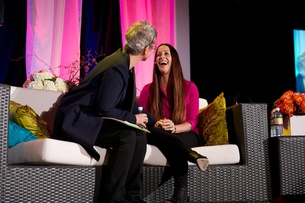 Tami Simon and Alanis Morissette at Emerging Women, October 2013. Image by 11:11 Productions.
Tami Simon and Alanis Morissette at Emerging Women, October 2013. Image by 11:11 Productions.
This quote really caught my attention when I first heard it. It was an interesting thought. The idea that art is healing and therapeutic, in and of itself, is something that I have taken as truth for a long time. Not only that, I hear my colleagues say it over and over again. So when I hear a respected artist say the complete opposite, I have to sit up and take notice.
So I listened to the interview repeatedly to see if I could get the gist of what she was saying. Then, while in my exploration, I came across an interview of Alanis by Oprah Winfrey on Super Soul Sunday where Alanis made this claim again:
"I actually think that art itself is cathartic, but it's not healing. I thought that I could get away with writing these songs and it would absolve me and redeem and clean up, but after having sung, 'You Oughta Know' night, after night, after night, if I ran into that person I would have likely been catapulted right back to feeling uncomfortably terrified and awkward. So it showed me that the process is cathartic, of creating and moving energy, and it can kick start, it can be a catalyst to investigate, but unless there's an actual relationship going on...there [is] not a lot of healing afforded".
Aha! This was interesting and juicy. I began to think about my own process. In a recent school assembly, a child asked what inspired me during my dances. I explained that there were various factors: the lyrics of the song, the people I'm working with, but also my mood. I told her that when I was in a happy mood, it was fun to dance the happy dances, but that when I'm sad or angry, it's just as fun to dance the sad or angry dances. Why? Because it's cathartic. After having a particularly difficult week, maybe because I wasn't feeling well or because I had had an argument with someone, I would get an amazing release from dancing out my anger onstage. It usually makes for a better performance too, when you channel that real energy and let it move you. I always feel uplifted afterwards.
This is where we get the idea that art is healing--this feeling of catharsis when we've moved that energy through us, especially if it has moved something in our audience as well. They get that catharsis too and in that moment, we are in relationship. So yes, that feels healing.
However, I can admit that I have spent years dancing out the anger over people or situations that I have not forgiven. Although I do feel like I've moved that anger through me and I have felt relief from doing so, I know full well that I have not healed that anger. It rears its ugly head over and over again, and although it often feels good to use it for my dancing, it eventually gets old, and it most certainly doesn't feel good when it shows up in the middle of my every day life. The only times I feel that I have actually healed my anger are when I have done the real work of forgiveness--when I have sat for hours and hours in meditation, with the intent to release that anger and forgive, and even more importantly, when I have actually done the work of having the conversation, meeting that person heart to heart, acknowledging my responsibility, and forgiving and letting go.
So yes, I guess Alanis has a point. In the interview with Simon, she goes on to define healing as "the return to the original wholeness and original truth of what we are—that innate goodness". In this definition, healing implies that we no longer see ourselves as right and others wrong. We just see ourselves as one in the same, part of a greater whole, equally capable of being both right and wrong. When I think about a lot of the professional relationships over the years, both mine and others I have witnessed, then I have to agree with Alanis. Our art has served as catharsis and part of a healing process, but not the healing itself.
So what do we do? We continue to move our energy through our art and use it as part of our therapy, but we need to do the other work. We need to do the work that allows us to see ourselves in the other and the other in us. The artists that I know who seem the happiest overall are those who have done this in some way, whether it be through meditation, therapy, prayer, service to others, or a combination of all these. Remember, art should bring people together. That union is where the real healing begins.
*The link to the Tami Simon interview can be found here: http://www.soundstrue.com/store/weeklywisdom/?page=single&category=IATE&episode=9909
You can watch the Oprah Winfrey interview here:
I think what Alanis said makes for an interesting dialogue among artists. What do you think about Alanis's point about catharsis vs. healing? Do you agree or disagree? I would love to hear your thoughts in the Comments section below.
 RSS Feed
RSS Feed
